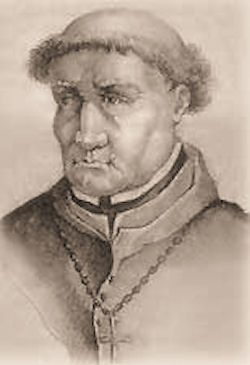The Spanish Inquisition - 1481-1781
 The Inquisition was established in Spain, during the reign of Ferdinand and Isabella, by John de Torquemada, a Dominican monk and confessor to the queen. Torquemada, indefatigable in his zeal for the holy chair, used every means to extirpate heresy and heretics, in the space of fourteen years that he exercised the office of chief inquisitor, is said to have prosecuted near eighty thousand persons, of whom six thousand were condemned to the flames. Voltaire attributes the taciturnity of the Spaniards to the universal horror such proceedings spread. "A general jealousy and suspicion took possession of all ranks of people : friendship and sociability were at an end! Brothers were afraid of brothers, fathers of their children."
The Inquisition was established in Spain, during the reign of Ferdinand and Isabella, by John de Torquemada, a Dominican monk and confessor to the queen. Torquemada, indefatigable in his zeal for the holy chair, used every means to extirpate heresy and heretics, in the space of fourteen years that he exercised the office of chief inquisitor, is said to have prosecuted near eighty thousand persons, of whom six thousand were condemned to the flames. Voltaire attributes the taciturnity of the Spaniards to the universal horror such proceedings spread. "A general jealousy and suspicion took possession of all ranks of people : friendship and sociability were at an end! Brothers were afraid of brothers, fathers of their children."
In Spain the Inquisition, as set up in 1481 by Ferdinand and Isabella, was as much (or more) a political as an ecclesiastical institution: the officials from highest to lowest were appointed by the sovereigns and its action was directed by them without responsibility to the Holy See: Ranke calls the Spanish Inquisition "a royal tribunal furnished with spiritual weapons"; Llorente admits as much. The number of persons put to death under sentence of the Inquisition in Spain is put by Llorente at 31,000 from first to last, that is during 330 years. But Llorente made it impossible to check his statements by burning the original documents.
Ranke impeaches his honesty; Prescott says that his estimates are "most improbable." Catholic historians call attention to the fact that not only heresy, but many other offenses against the laws were judged by the courts of inquisition in Spain, viz: polygamy, seduction, unnatural crimes, smuggling, witchcraft, sorcery, false personation, etc. At the time when the Inquisition flourished, persecution for heresy was a universal practice amongst all Christian peoples, and the methods of punishment inflicted were general throughout Europe. Protestant England persecuted as harshly and vigorously as Catholic Spain, and in both countries denial of the state religion was equivalent to treason.
A correct estimate of the Spanish Inquisition must judge it not according to the maxims of the nineteenth century, but according to those of the age in which it sprang up. In the fifteenth aud sixteenth centuries, the principle eujus est regio, illius et religio, (and this was the basis of Spain's State-Inquisition,) was everywhere in full force, and in Protestant States, was, to say the least, as severely applied, as in Spain.
The penal code of those times was much bloodier, than that of the present ago. Moderns may now be amazed at the severity of the so-called Carolina a criminal judicature established by Charles V, in the year 1532 ; and yet this was a mitigation of the law prevalent in the fifteenth century. But even the Carolina annexes to religious offences blasphemy against God, for example, and the Blessed Virgin, the penalty of death; and Sodomites are threatened with the punishment of fire. The same severity is found in the chastisement of purely civil offences; the coiner, for instance, is to be burned; aud every repetition of theft to bo punished with death. In like manner, in France, formerly the slightest offence against the safety of public high-ways, was visited with capital punishment.
Capital punishment, on account of heresy, was, in former times, common to all countries, and to all religious communions. Of this Michael Servetus is an example, who, at Calvin's instigation, suffered at Geneva, on the 27th of October, 1553, on the charge of heresy, a painful and lingering death by fire. Even the 'mild' Melancthon, in a letter addressed to Calvin, approved and lauded this proceeding. And besides Servetus, many others, like Valentine Qentilis, Bolsec, Carlstadt, Gruet, Castalio, and the Councillor Ameaux, were taught by imprisonment, exile, and death, that amowg Protestants no milder Inquisition prevailed than in Spain. Nay, so late as the year 1724, a young soldier at Reaudsburg, in Holstein, for the offence of having made a league with the devil, was, by a royal indulgence, punished merely with decapitation. And at Bern, in the year 1753, a fanatic, Jerome Kohler, was, under the charge of 'blasphemy,' strangled and burned.
The so-called witches and magicians constitute a very considerable portion of the victims of the Inquisition; and it is needless to say that these unfortunate creatures sustained no less bloody persecution in Germany than in Spain, and on the part of Protestants not less so than that of Catholics. Nay, in the year 1781, the Spanish Inquisition pronounced its last sentence of death; and one year later, (1782,) a Calvinistic tribunal, in the Canton of Glarus, burned a witch.
|
NEWSLETTER
|
| Join the GlobalSecurity.org mailing list |
|
|
|

